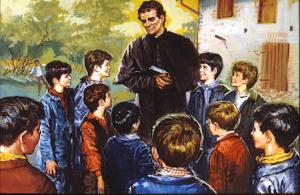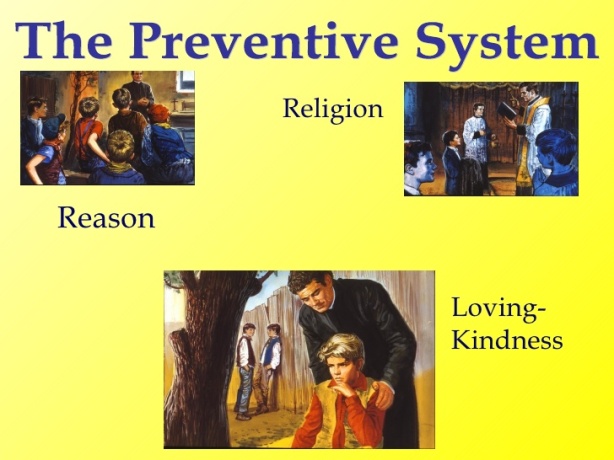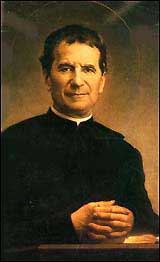by Marlon De La Torre, Department Director for Catechesis, Catholic Diocese of Fort Worth
Imagine for a moment that you’re a catechist in a parish religious education program or Catholic school and you suddenly realize that all of your students have a very high value of themselves.
And, upon realizing this fascinating phenomenon you also realize that the majority of your students do not associate their high value as children created in the image and likeness of God.
Gasp! Your first reaction may be to put your students in their place and set aside any semblance of a merciful act. If this is the case, St. John Bosco developed a profound educational system called the Preventive System. In short, this system provides us with a clear path toward incorporating a genuine atmosphere of mercy that at times is sorely needed within the life of a child.
St. John Bosco was one of the greatest teachers of the Catholic faith, especially in reaching the young men of his day. His proving ground was the very difficult streets of Turin, Italy where the theological virtue of charity was more hoped for than seen; any genuine display mercy, spiritual or corporal was non-existent on a daily basis. Knowing the environment he had to work with Don Bosco made it his aim for “his boys” to see themselves as children of God. He desired to “save their souls.”
There was no miscommunication on St. John Bosco’s part on his intent to reach the souls of these boys. Because of his direct, stern, yet merciful loving approach many children were taken aback on how direct he was towards them: a “fight fire with fire” approach but, with Christ at the center. This aspect of his approach was essential in reaching these children because he showed them a profound love of forgiveness and at the same time held them accountable for their actions.
The Preventive System is an approach based on three core principles: Reason, Religion, and Kindness. Each principle has a specific point to bring the child closer to Christ.
The Principle of Reason provides a reasonable atmosphere where the child would be given the opportunity to consent to instruction and guidance. The goal of this first principle is to develop good Christians and useful citizens. The teacher must be the bridge to a child’s discovery of the world through patience, diligence, and prayer.
The Principle of Religion stressed the ugliness of sin and the value of living a virtuous life. The aim is to develop the intellectual and physical gifts the child possesses and how he can be directed toward a greater good. There are five steps within this principle to help youth attain personal holiness:
- Holiness of ordinary life
- The joy and optimism of holiness
- Centrality of Confession
- The Holy Eucharist
- Love of Mary
The Principle of Kindness emphasizes the virtue of love. St. John Bosco would stress: “Let us make ourselves loved, and we shall possess their hearts.” In other words, our Christian witness must be genuine, merciful and constant for spiritual development of the child. The learning environment should be warm and inviting, not cold. The family spirit reigned; he did this through rapport, friendliness, presence, mercy, respect, attention, dedication to service, and personal responsibility.
The core of all three principles of the Preventive System is to draw the child away from an individualistic view. As the last principle stressed: “the family spirit reigned.” St. John Bosco’s premise is that the child should know that he is part of God’s plan by the very fact he was created in His image and likeness. This in turn will help the child view that everyone is made in the image of God.
What made St. John Bosco’s methods so effective was his willingness to go into the heart of the child regardless of his state in life and see Christ in him. Wisdom tells us these methods not only served St. John Bosco well; they can also reawaken a child’s relationship with Christ. The essential goal of the Preventive System is to foster productive Catholic citizens who seek to assist others before themselves. When teaching his students about his Preventive System St. John Bosco would always remind them: “Get them to love you and they’ll follow you anywhere.”
St. John Bosco, pray for us!
Let us hear from you!
-In one way or another we have all implemented all or parts of the Preventive System. Please share with us how you have implemented any or all of this system in your parish or school.
-What is your school or parish doing for the Year of Mercy?
Want more information about the Preventive System? Go to:
http://www.donboscowest.org/resources/preventive-system
Movie about St. John Bosco:
http://www.ignatius.com/Products/SJBML-M/st-john-bosco.aspx











In our Parish Religious Education Program we have instituted the, “Mercy Matters” Program to help us identify and celebrate the Jubilee Year of Mercy. Each month a student from each class will be awarded a Mercy Matters Certificate for his/her merciful behaviors (helping others, sharing, forgiving, being tolerant, etc.). Each Catechist has been incorperating lessons on Mercy for their particular grade level.
LikeLike
What happens to the first principle, reason, in a world that does not reason?
LikeLike
Jodie – I posed your question to the article author, Marlon De La Torre, and here is his response:
The first premise of reason is to introduce the person to the possibility of something being just, visible, viable and thus reasonable. A person may state that the Catholic faith is unreasonable for whatever reason e.g. the Ten Commandments, the Sacrament of Penance etc. but a person cannot completely deny the fact that the Ten Commandments or the Sacrament of Penance may help a person if he so wishes and chooses.
The virtue of reason is tied to the virtue of common sense. If someone is hungry you feed them, if someone is thirsty you give them something to drink. The grace of reason allows us to see the value of a human being and thus see the love of God in each person created in His image and likeness. If someone disagrees with reason it is there choice but they cannot completely ignore the visible facts behind the first premise to anything as St. John Bosco stated.
LikeLike